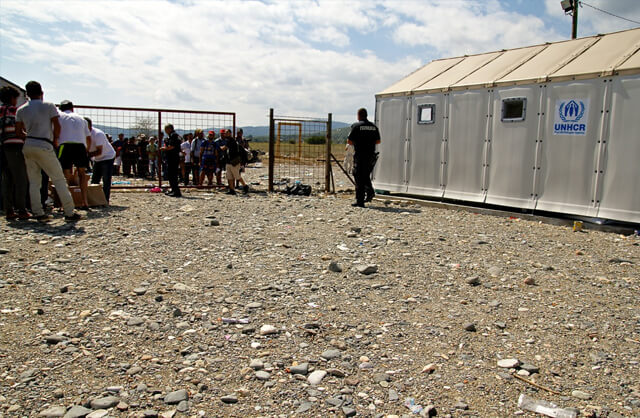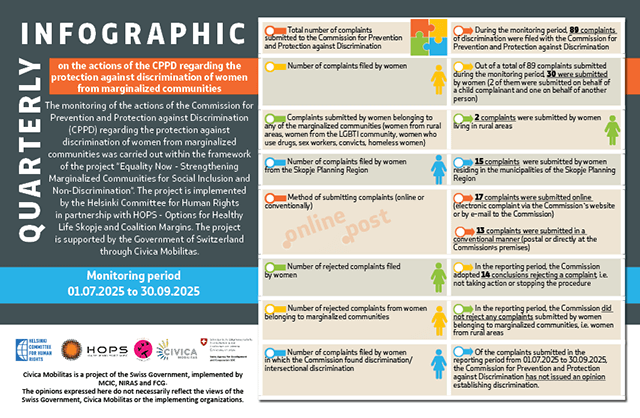The situation at the border crossings Gevgelija and Kumanovo for the period: 21.03.2016 – 27.03.2016
March 29, 2016

The weekly report on the situation at the border crossings Gevgelija and Kumanovo includes the following topics: Available facilities and conditions at the camp and Institutional treatment.
Gevgelija
Available facilities and conditions
Not a single refugee was registered in the Republic of Macedonia this week.
At the moment, the number of refugees present at the camp in Vinojug, Gevgelija, is 135.
In some of the cabins in the camp there is no electricity and heaters, which is a problem on those days when the temperatures are lower and there is rainfall during the nights.
The camp kitchen is fully equipped and has started functioning. However, according to the testimonies of the refugees, the meals they are being served in the course of the week are not hot, cooked meals, but canned food which is often not enough for everyone. Only the Red Cross is in charge of distributing food, while the remaining organizations have been told not to bring food.
The space and facilities in the camp are being reorganized, new cabins have been set up, and also a newly built facility has been prepared where only new clothes will be distributed.
Institutional treatment
On 21.03.2016, the police caught a group of 50 Afghans and Iraqis who had crossed the border between the villages of Bogorodica and Selemlii illegally. The group was taken to the police station for examination. The examination lasted all through the day, and it is unknown what happened to the group afterwards.
On 22.03.2016, 45 refugees from the camp in Tabanovce, originating from Syria and Iraq, were transported to the camp in Gevgelija. They were all given humanitarian and medical aid. The competent institutions took their Macedonian documents.
On 26.03.2016, another group of 49 refugees arrived in the camp, all of them originating from Syria. They were transported in a truck, after they had tried to flee from the buffer zone between the borders in Tabanovce. They were in a bad health and with poor hygiene. They were immediately provided with medical and humanitarian aid. Together with them, a 16 year old girl from Nigeria was also transported, who had travelled alone and expressed a wish to go back to Greece.
Kumanovo
Available facilities and conditions
A wire fence is being set up around the camp in Tabanovce. The fence set up on the way from the camp to the border with Serbia is also being replaced.
The kitchen is fully equipped and functioning.
The number of refugees in the camp amounts to around 800, while the number of refugees in the buffer zone between the borders is around 300. The hygienic conditions they are left in are alarming, but they refuse to go back to the camp or be relocated to the camp in Gevgelija for fear they will be deported to Greece.
Institutional treatment
In the course of the week, the police had an order not to allow access to the activists and volunteers to the buffer zone where the refugees are staying, allegedly due to the construction works for the fence by the road. Only UNHCR and the Red Cross were given access, and they were in charge of taking food to the refugees. It is alarming that unlike before, the refugees from this area were not allowed to go back to the camp in Tabanovce.
On 22.03.2016, a physical conflict of a more serious character occurred between Afghan groups, whereby the PEP service had to react.
On 25.03.2016, a larger number of refugees from the buffer zone were sheltered in the camp in Tabanovce, while a group of 50 people were transported back to the camp in Gevgelija. A smaller group of Afghans tried to cross the Serbian border illegally, whereby they were arrested by the Serbian police.
A mother with three children who reported domestic violence in the course of the previous week was sheltered in a safe house with the mediation of the Ministry of Labour and Social policy.
On 27.03.2016, around 200 refugees in the camp got a food poisoning. This unfortunate event was due to the poor hygiene in the camp. The Food Agency of the Republic of Macedonia, as well as inspection teams, paid a visit to the camp in order to determine which food caused the poisoning.
The Helsinki Committee warns that more serious and proactive measures need to be taken to maintain the hygiene in the camp, in order to avoid damaging the health of all the affected people in the camp.
 This report is made possible by the generous support of the Foundation Open Society Institute (FOSI) within the project „Improvement of the rights protection for migrants and asylum seekers in the Republic of Macedonia“. The contents are the responsibility of the Helsinki Committee for Human rights of the Republic of Macedonia and do not necessarily reflect the views of FOSI.
This report is made possible by the generous support of the Foundation Open Society Institute (FOSI) within the project „Improvement of the rights protection for migrants and asylum seekers in the Republic of Macedonia“. The contents are the responsibility of the Helsinki Committee for Human rights of the Republic of Macedonia and do not necessarily reflect the views of FOSI.


